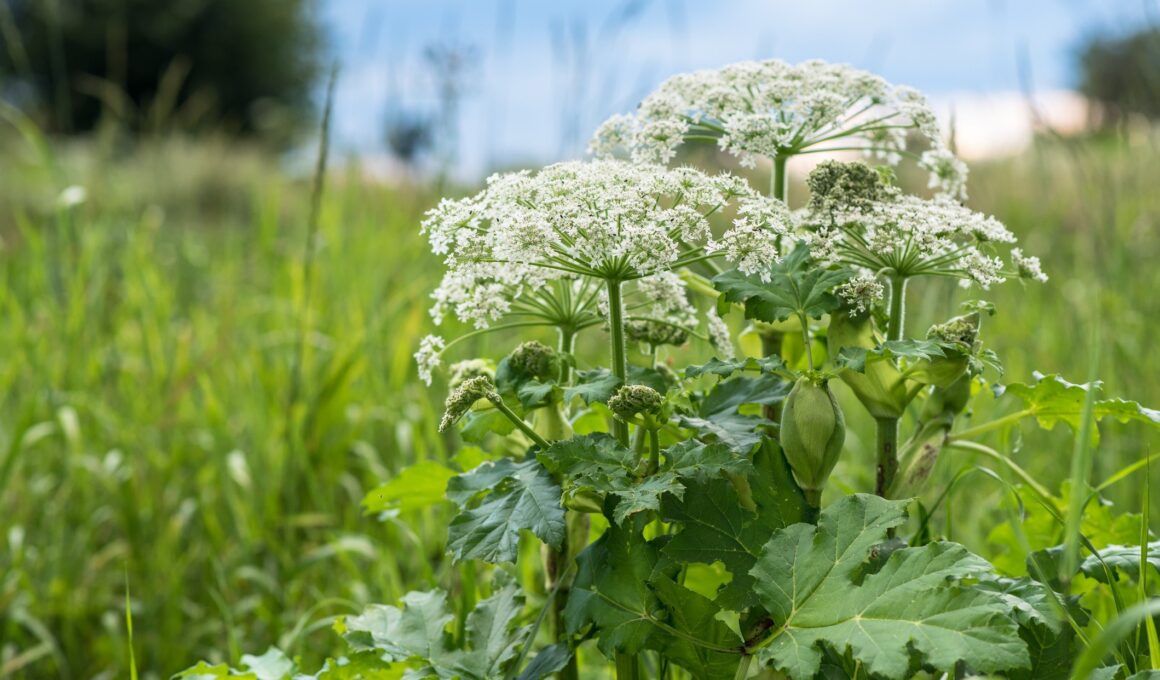Americans, beware: A seemingly innocuous green plant commonly found in backyards and parks can burn and scar skin by altering your DNA. (Warning: Graphic image ahead.)
What sounds like science fiction is actually the unpleasant-sounding giant hogweed. The pretty plant with flowers is, in fact, a massive invasive species that can cause major damage and is creating cause for concern across the U.S.
The British originally brought giant hogweed to the States through the United Kingdom. In the 1800s, Britons first imported the large plants from the Caucasus Mountains in Eurasia to their home turf.
The Brits loved its large size: True to its name, giant hogweed can grow up to 14 feet tall, and its leaves sometimes reach 5.5 feet in diameter. The monster plant’s white flower clusters can grow up to 2.5 feet in diameter.

(Getty Images)
Once the Brits brought the spiky plant to America in the early 1900s as a garden decoration, it began to take over.
The plant has been documented in parts of Connecticut, Illinois, Maine, Maryland, Massachusetts, Michigan, Ohio, Oregon, Washington, DC, Pennsylvania, Washington, and Wisconsin, as well as areas of Canada. Each plant produces around 50,0000 seeds, and because it tends to cluster around rivers and streams, the seeds spread easily.
Here’s what you need to know about this harmful plant that may be hiding in plain sight right outside your backdoor.
The plant causes major pain
The clear, watery sap from giant hogweed contains a toxin called furanocoumarin, which is activated by sunlight and creates a skin irritation called phytophotodermatitis.

(Courtesy of DermNet New Zealand)
The condition often results in painful and unsightly blistering and burning, which can be further inflamed by heat and moisture. Sometimes, the blisters won’t show for a few days after exposure, but they can have long-lasting scars. Scarring from giant hogweed sap has been known to last as long as six years.
The unruly plant can also create similar symptoms in pets. It’s also been known to cause blindness in dogs whose eyes are exposed to the sap.
What to do if you encounter giant hogweed
First things first: Try to get rid of giant hogweed in your yard very carefully.
Glyphosate cleaners like Roundup, KleenUp, and Killzall can effectively kill hogweed. Nonchemical options like digging the plant up or mowing it can help.
But whatever you do, avoid touching it. The potential reaction is severe enough that members of New York’s Giant Hogweed Control Program go out in full hazmat suits and masks when clearing the plants.
If you’re unfortunate enough to randomly come in contact with this contentious plant, the New York State Department of Health advises that you immediately wash the affected body part with soap and water and avoid touching your eyes.
Applying sunscreen to the affected area might also help ease the pain of the burn. Experts suggest that you also stay out of the sunlight for a few days, even after you treat the area.
The sap can linger on your clothing, so if you come in contact with it, you should wash your clothes as soon as possible, too.
The lasting effects of giant hogweed
How bad can the burns get? In 2018, a Richmond, VA, teenager came in contact with giant hogweed and suffered third-degree burns.
Alex Childress encountered hogweed while working in a landscaping job. His father told their local CBS affiliate that “the skin on his face was basically peeling away and peeling off.”
The burns were so severe that Childress was considering postponing attending college.
This past summer, a 9-year-old boy in Sunderland, U.K., came in contact with hogweed while playing soccer in a park. Three days later, his skin began blistering.
So let this be a warning: If you see giant hogweed where you live, you should immediately report it to your state’s Department of Health—there’s also a toll-free Giant Hogweed Hotline for reporting sightings—and stay away from the sap!
What’s being done to stop the invasive plant
Aside from the human consequences of giant hogweed, there are also environmental ones. The plant can grow so large that it blocks sunlight from other plants and causes soil erosion.

(Courtesy of New York Department of Environmental Conservation)
To combat it, New York’s Bureau of Invasive Species and Ecosystem Health runs a program to increase awareness and clear the plant. In the past year, it has cleared 1,765 properties, or 61% of the state’s known giant hogweed sites.
Unfortunately, giant hogweed isn’t the only plant that has poisonous sap. Wild parsnips and cow parsnips have the same toxin in their leaves but at much lower concentrations than hogweed. (You still shouldn’t touch them, though!)







